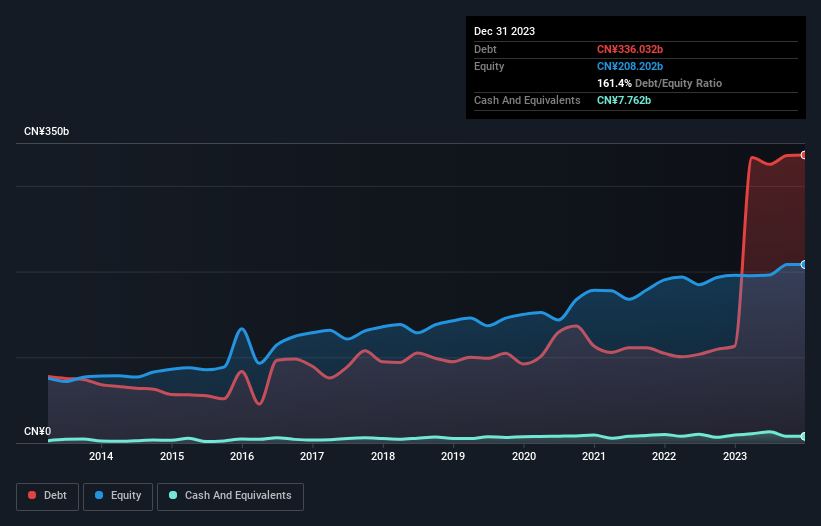- China
- /
- Renewable Energy
- /
- SHSE:600900
Here's Why China Yangtze Power (SHSE:600900) Can Manage Its Debt Responsibly

Some say volatility, rather than debt, is the best way to think about risk as an investor, but Warren Buffett famously said that 'Volatility is far from synonymous with risk.' It's only natural to consider a company's balance sheet when you examine how risky it is, since debt is often involved when a business collapses. As with many other companies China Yangtze Power Co., Ltd. (SHSE:600900) makes use of debt. But should shareholders be worried about its use of debt?
When Is Debt A Problem?
Generally speaking, debt only becomes a real problem when a company can't easily pay it off, either by raising capital or with its own cash flow. Part and parcel of capitalism is the process of 'creative destruction' where failed businesses are mercilessly liquidated by their bankers. However, a more frequent (but still costly) occurrence is where a company must issue shares at bargain-basement prices, permanently diluting shareholders, just to shore up its balance sheet. By replacing dilution, though, debt can be an extremely good tool for businesses that need capital to invest in growth at high rates of return. The first step when considering a company's debt levels is to consider its cash and debt together.
View our latest analysis for China Yangtze Power
How Much Debt Does China Yangtze Power Carry?
The image below, which you can click on for greater detail, shows that at September 2023 China Yangtze Power had debt of CN¥336.0b, up from CN¥112.9b in one year. However, because it has a cash reserve of CN¥7.76b, its net debt is less, at about CN¥328.3b.

How Healthy Is China Yangtze Power's Balance Sheet?
According to the last reported balance sheet, China Yangtze Power had liabilities of CN¥155.6b due within 12 months, and liabilities of CN¥215.1b due beyond 12 months. Offsetting these obligations, it had cash of CN¥7.76b as well as receivables valued at CN¥24.1b due within 12 months. So its liabilities outweigh the sum of its cash and (near-term) receivables by CN¥338.8b.
This deficit isn't so bad because China Yangtze Power is worth a massive CN¥604.9b, and thus could probably raise enough capital to shore up its balance sheet, if the need arose. But we definitely want to keep our eyes open to indications that its debt is bringing too much risk.
We use two main ratios to inform us about debt levels relative to earnings. The first is net debt divided by earnings before interest, tax, depreciation, and amortization (EBITDA), while the second is how many times its earnings before interest and tax (EBIT) covers its interest expense (or its interest cover, for short). The advantage of this approach is that we take into account both the absolute quantum of debt (with net debt to EBITDA) and the actual interest expenses associated with that debt (with its interest cover ratio).
Strangely China Yangtze Power has a sky high EBITDA ratio of 7.4, implying high debt, but a strong interest coverage of 16.0. So either it has access to very cheap long term debt or that interest expense is going to grow! We note that China Yangtze Power grew its EBIT by 23% in the last year, and that should make it easier to pay down debt, going forward. When analysing debt levels, the balance sheet is the obvious place to start. But ultimately the future profitability of the business will decide if China Yangtze Power can strengthen its balance sheet over time. So if you want to see what the professionals think, you might find this free report on analyst profit forecasts to be interesting.
But our final consideration is also important, because a company cannot pay debt with paper profits; it needs cold hard cash. So it's worth checking how much of that EBIT is backed by free cash flow. Over the last three years, China Yangtze Power recorded free cash flow worth a fulsome 93% of its EBIT, which is stronger than we'd usually expect. That positions it well to pay down debt if desirable to do so.
Our View
The good news is that China Yangtze Power's demonstrated ability to cover its interest expense with its EBIT delights us like a fluffy puppy does a toddler. But we must concede we find its net debt to EBITDA has the opposite effect. Looking at all the aforementioned factors together, it strikes us that China Yangtze Power can handle its debt fairly comfortably. Of course, while this leverage can enhance returns on equity, it does bring more risk, so it's worth keeping an eye on this one. When analysing debt levels, the balance sheet is the obvious place to start. But ultimately, every company can contain risks that exist outside of the balance sheet. We've identified 2 warning signs with China Yangtze Power (at least 1 which doesn't sit too well with us) , and understanding them should be part of your investment process.
When all is said and done, sometimes its easier to focus on companies that don't even need debt. Readers can access a list of growth stocks with zero net debt 100% free, right now.
New: AI Stock Screener & Alerts
Our new AI Stock Screener scans the market every day to uncover opportunities.
• Dividend Powerhouses (3%+ Yield)
• Undervalued Small Caps with Insider Buying
• High growth Tech and AI Companies
Or build your own from over 50 metrics.
Have feedback on this article? Concerned about the content? Get in touch with us directly. Alternatively, email editorial-team (at) simplywallst.com.
This article by Simply Wall St is general in nature. We provide commentary based on historical data and analyst forecasts only using an unbiased methodology and our articles are not intended to be financial advice. It does not constitute a recommendation to buy or sell any stock, and does not take account of your objectives, or your financial situation. We aim to bring you long-term focused analysis driven by fundamental data. Note that our analysis may not factor in the latest price-sensitive company announcements or qualitative material. Simply Wall St has no position in any stocks mentioned.
About SHSE:600900
China Yangtze Power
Engages in operation, management, consultation, investment, and financing of hydropower stations in the People’s Republic of China, Portugal, Peru, Brazil, and Pakistan.
6 star dividend payer with solid track record.
Similar Companies
Market Insights
Community Narratives



